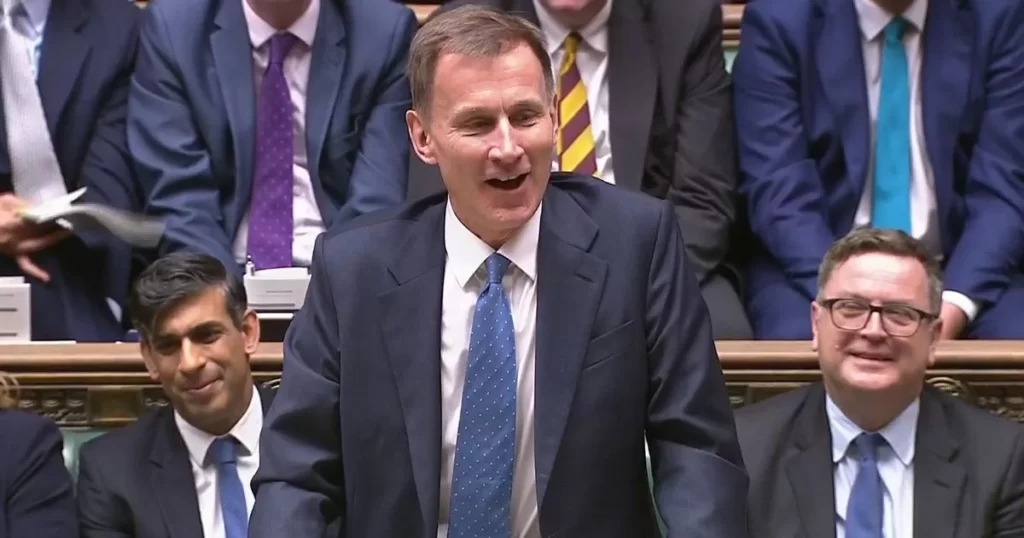The Welsh government issued a cautionary statement indicating the possibility of revising its budget just a day after Senedd approval.
This potential adjustment is contingent on any tax and spending policy changes introduced by Jeremy Hunt in his March 2024 budget, which could impact Wales.
Rebecca Evans, Cardiff’s finance minister, expressed apprehension about the fate of her budget, originally presented as a draft for discussion in 2023 and scheduled for finalization on March 5, 2024.
She said radical measures by Hunt in his budget could render the Welsh budget obsolete.
Evans also criticized Hunt for making the finance ministry’s task challenging by withholding crucial information in the lead-up to the spring budget, hindering effective budget planning and management.
She said, “We were only told on 13 February what the allocation for Wales would be, leading us to update the draft budget. Now we could be forced to make further changes.”
The Labour-run Welsh administration called on Hunt to fill a £1.2bn deficit in funding brought about by high inflation over the past two years.
Evans emphasized that Wales had been significantly impacted by stringent limitations on borrowing and regulations dictating the utilization of its reserves.
She advocated for the relaxation of these constraints to better manage the challenges stemming from the Covid-19 pandemic and the escalating costs resulting from the Ukraine conflict, similar to the measures adopted in Scotland.
Evans said the UK government should reject tax cuts in favor of setting aside spare funds to increase public services across the four nations.
“Whatever financial headroom is available to the chancellor, he should spend it on public services,” she said.
“Our health budget is going to get 4% extra next year, but that will need to come from other areas and will still leave the Welsh health service underfunded compared to England,” Evans added.
She suggested Hunt increase the Welsh financial arrangement or face the possibility of Wales enduring more severe cutbacks in public services than England.
The latest budget announcement for Wales revealed that Cardiff’s expenditure for the upcoming financial year would surpass £26.6 billion.

Budget Concerns and Calls for Equity from the Welsh Government
However, there were notable adjustments in day-to-day spending on public services, which amounts to £20.9 billion. Except for health and select net zero projects, most departments would face cuts, resulting in a £220 million deficit in their spending plans.
Ministers had aimed to boost public investment in crucial infrastructure projects. Yet, despite these plans, the current trajectory indicated a 3.2% decrease to £2.9 billion, attributed to a reduction in allocation by officials in London.
Evans said taking inflation into account means it adds up to a 9% cut “that prevents us investing in infrastructure and the skills we need to grow the economy”.
Also, the 2025 budget is set to significantly reduce funding in various sectors, with childcare experiencing substantial cuts. Despite this, Evans noted that heightened demand might compel a reconsideration of some of the spending reductions.
Evans’ anger at what she calls “the disregard shown by the UK government” includes a call to increase the level of reserves, which was set at £350m in 2018 and had fallen by 23% in value due to inflation.
Borrowing was limited to £158m in any one year up to a total cap of £1bn, which Evans said had also “significantly fallen in value” over the past three years.
She said, “Scotland has had its borrowing and reserve limits lifted while Northern Ireland has had a generous settlement following the re-opening of its parliament. Now it is time Wales benefited.”
However, a UK government spokesperson said Wales had received about 20% more funding per person than equivalent Westminster spending in other parts of the UK.
“The Welsh government is receiving a record £18bn per year from the UK government,” the spokesperson said.
The spokesperson also refuted claims that it failed to communicate with ministers in Wales.
READ ALSO: George Galloway’s Rochdale Victory: Blow to Labour























